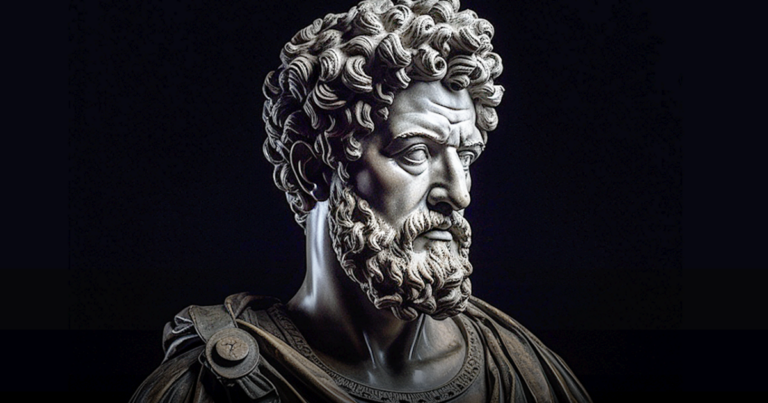“It is not events that disturb people, it is their judgments concerning them.” – Epictetus.
Imagine a world where external events no longer dictate your happiness, where you have complete control over your emotions, and where you can find peace in the midst of chaos. Welcome to the world of Stoicism, an ancient philosophy that has guided countless individuals towards personal growth and fulfillment for centuries. At the heart of this philosophy lies the wisdom of Epictetus, a former slave turned philosopher, who transformed his life through the power of Stoic thought. Today, we’ll dive into the teachings of this extraordinary man and uncover the top 10 lessons from his renowned work, the Enchiridion.
Epictetus was born in Phrygia, present-day Turkey, around 50 AD. Despite being born into slavery, he rose above his circumstances and became one of the most influential Stoic philosophers of all time. As a slave, he was owned by a high-ranking Roman official, who recognized his intellectual potential and allowed him to study philosophy. Epictetus eventually became a student of the philosopher Musonius Rufus, who was a prominent Stoic teacher in Rome.
After gaining his freedom, He began teaching philosophy in Rome, where his reputation quickly grew. However, when the Roman Emperor Domitian expelled all philosophers from Rome in 89 AD, Epictetus was forced to flee. He found refuge in Nicopolis, Greece, where he established a philosophical school that attracted students from across the Roman Empire.
His teachings were recorded by one of his students, Arrian, who compiled them into two main works: the Discourses and the Enchiridion. The Enchiridion, also known as the “Handbook” or “Manual,” is a concise collection of Epictetus’s most essential teachings. It is a practical guide to living a virtuous life, providing valuable insights on how to navigate the challenges and uncertainties of our existence.
The Stoic philosophy, centers on the idea that we cannot control external events, but we can control our reactions to them. By cultivating inner strength, wisdom, and resilience, we can remain calm and composed in the face of adversity. This is achieved by focusing on our own actions and thoughts, rather than being swayed by external circumstances or the opinions of others.
As we embark on this journey through the Enchiridion, remember that the words of Epictetus are not just abstract ideas or theories; they are practical tools that can be applied to your everyday life. By embracing these lessons and incorporating them into your daily routine, you can build a strong foundation for personal development and create a more fulfilling, purposeful existence.
Lesson 1. Differentiating between what is in our control and what is not.
One of the core principles of Stoic philosophy, as espoused by Epictetus in the Enchiridion, is the understanding that we should focus our energy on what is within our control and accept what is not. This simple yet powerful concept can have a profound impact on our well-being and overall satisfaction with life.
Epictetus believed that our thoughts, beliefs, and actions are within our control, while external events, the actions of others, and the natural world are not. By recognizing this distinction, we can save ourselves from unnecessary stress, anxiety, and disappointment.
Let’s explore an example to illustrate this lesson. Imagine you’re preparing for an important job interview. You’ve spent weeks researching the company, practicing your responses, and honing your skills. On the day of the interview, however, a major traffic jam causes you to arrive late, and you miss the opportunity.
While it’s natural to feel frustrated and upset in this situation, Epictetus would advise us to focus on what we can control. We cannot change the traffic or the fact that we missed the interview, but we can control our reaction to the situation. Instead of dwelling on the missed opportunity, we can choose to learn from the experience, adapt our approach, and continue our job search with renewed determination.
By applying this lesson, we can develop a greater sense of inner peace and resilience in the face of life’s challenges. When we accept the inherent unpredictability of the world and focus on the aspects of our lives that we can influence, we empower ourselves to cultivate a mindset of growth and adaptability. This way, we can navigate through the ups and downs of life with grace and composure, making the most of every situation and maintaining our equilibrium in the face of adversity.
Lesson 2. Embracing the concept of fate and accepting events in life.
Another crucial lesson from the Enchiridion is the idea of accepting fate and learning to embrace the natural course of events in life. According to Stoic philosophy, the universe follows a rational order, and everything that happens is a part of this cosmic plan. By accepting the notion of fate, we can cultivate an attitude of serenity and learn to appreciate life’s experiences, both positive and negative.
Embracing fate doesn’t mean passively resigning ourselves to whatever happens. Rather, it encourages us to focus on what we can control and develop the wisdom to accept and adapt to the circumstances we cannot change. By doing so, we can find peace and purpose in even the most challenging situations.
Consider this example: You’ve been planning a vacation for months, and you’re looking forward to a well-deserved break. Just days before your departure, however, you become ill and are unable to travel. While it’s natural to feel disappointed and frustrated, Epictetus would remind us that our health is ultimately outside of our control. By embracing the concept of fate and accepting the situation, we can prevent ourselves from becoming overwhelmed by negative emotions.
In practical terms, this might mean focusing on our recovery, using the unexpected free time to catch up on personal projects, or spending quality time with loved ones. By reframing our perspective and finding the silver lining in the situation, we can turn a seemingly negative event into an opportunity for growth and learning.
Learning to accept fate and embrace the natural order of the universe allows us to develop a sense of equanimity in the face of life’s uncertainties. When we approach life with an open heart and a willingness to adapt, we can find meaning and joy in every experience, regardless of the outcome. This mindset of acceptance and adaptability can ultimately lead to a more fulfilling and contented life.
Lesson 3. Pursuing a virtuous life.
A central tenet of Stoic philosophy, as presented by Epictetus in the Enchiridion, is the pursuit of virtue as the ultimate goal in life. Virtue, in this context, refers to moral excellence and the development of one’s character. According to Epictetus, a virtuous life is intrinsically valuable and leads to true happiness and fulfillment.
The Stoics believed that there are four main virtues: wisdom, courage, justice, and temperance. By cultivating these virtues in our daily lives, we can become better individuals and contribute positively to our communities.
Let’s consider an example to illustrate how we might apply this lesson. Suppose you find a wallet on the street, containing a significant amount of cash and the owner’s identification. While it might be tempting to keep the money, pursuing a virtuous life would involve making the effort to return the wallet to its rightful owner. In doing so, you practice the virtues of justice (by treating others fairly) and wisdom (by understanding the importance of honesty and integrity).
By consistently choosing virtuous actions, even in challenging situations, we develop our character and strengthen our moral compass. Over time, these decisions can lead to a sense of deep satisfaction and self-respect, as well as the admiration of others. By prioritizing virtue above material possessions or external validation, we can create a solid foundation for lasting happiness and personal growth.
Pursuing a virtuous life is a key lesson from the Enchiridion and an essential aspect of Stoic philosophy. By striving to cultivate moral excellence and uphold the values of wisdom, courage, justice, and temperance, we can enrich our lives and contribute positively to the world around us. By embracing these principles, we can begin to experience the true happiness and fulfillment that Epictetus believed was attainable through a life of virtue.
Lesson 4.Detachment from material possessions and external circumstances.
In the Enchiridion, Epictetus emphasizes the importance of developing a sense of detachment from material possessions and external circumstances. According to Stoic philosophy, our happiness and well-being should not be dependent on external factors, as they are inherently impermanent and outside our control. Instead, we should cultivate inner strength and self-sufficiency, finding contentment in our own actions and thoughts.
By practicing detachment, we can free ourselves from the desire for external validation and the fear of loss, which can cause unnecessary suffering and anxiety. This does not mean that we should abandon our possessions or relationships; rather, we should maintain a healthy perspective and recognize that they are not the source of our happiness.
To illustrate this concept, let’s consider an example. Imagine you’ve worked hard to build a successful career and have amassed a substantial amount of wealth. While you might feel a sense of pride and satisfaction in your accomplishments, Epictetus would caution against becoming too attached to these external markers of success. Instead, he would encourage you to focus on your inner values and virtues, which are the true sources of lasting happiness.
To apply this lesson in your daily life, you could practice gratitude for what you have while remaining mindful of the impermanence of material possessions. You might also choose to engage in acts of generosity, such as donating to charity or volunteering your time, to help you maintain a balanced perspective on the importance of wealth.
detaching from material possessions and external circumstances is a crucial lesson from the Enchiridion and an essential aspect of Stoic philosophy. By cultivating this mindset, we can develop a greater sense of inner peace and resilience, ultimately leading to a more fulfilling and purposeful life.
Lesson 5: Practicing self-discipline and self-control.
The fifth lesson from the Enchiridion revolves around the importance of self-discipline and self-control, critical components of a virtuous life according to Stoic philosophy. Epictetus believed that mastery over one’s impulses and desires was crucial for maintaining mental tranquility and achieving personal growth.
Self-discipline and self-control involve the ability to resist short-term gratification in favor of long-term benefits, as well as the ability to control our reactions to external circumstances. This practice can be seen as a form of personal freedom, as it liberates us from being slaves to our impulses and allows us to live in accordance with our core values and principles.
Consider the example of maintaining a healthy lifestyle. It’s often tempting to indulge in unhealthy foods or skip exercise in favor of more sedentary activities. However, by exercising self-discipline, you can resist these short-term temptations and prioritize your long-term health and well-being. This could involve creating a regular exercise routine, preparing healthy meals, and ensuring you get enough sleep.
Applying this lesson requires consistent effort and practice, but the rewards are significant. By developing self-discipline and self-control, you can make better decisions, achieve your goals more effectively, and live a more balanced and fulfilling life.
practicing self-discipline and self-control is a valuable lesson from the Enchiridion and a key component of Stoic philosophy. By mastering our desires and reactions, we can experience the personal freedom and lasting satisfaction that comes from living in harmony with our values and principles.
Lesson 6. Overcoming fear and anxiety by focusing on rational thinking.
The sixth lesson from the Enchiridion emphasizes the importance of rational thinking in overcoming fear and anxiety. Epictetus believed that many of our negative emotions arise from irrational beliefs and assumptions. By examining these thoughts and replacing them with rational perspectives, we can alleviate unnecessary suffering and develop a more balanced mindset.
One of the primary techniques for achieving this is to question our thoughts and assumptions, especially when they cause us distress. By identifying the irrational beliefs that underlie our fears and anxieties, we can challenge them and replace them with more realistic perspectives.
For instance, imagine you’re preparing for a public speaking engagement, and you’re feeling extremely anxious. Your fear might be based on the irrational belief that if you make a mistake or stumble over your words, you’ll be ridiculed and judged by your audience. To apply rational thinking, you could remind yourself that everyone makes mistakes, and it’s unlikely that your audience will be overly critical. Moreover, you can recognize that your value as a person isn’t determined by a single performance. By replacing your irrational beliefs with more balanced thoughts, you can reduce your anxiety and approach the situation with greater confidence.
Another strategy is to focus on the present moment and avoid dwelling on negative hypothetical scenarios. Often, our fears and anxieties stem from our tendency to imagine worst-case outcomes. By grounding ourselves in the present and concentrating on the task at hand, we can minimize the impact of these unproductive thoughts and maintain a more balanced state of mind.
In conclusion, the sixth lesson from the Enchiridion teaches us the power of rational thinking in overcoming fear and anxiety. By challenging our irrational beliefs and focusing on the present moment, we can develop a more stable mindset and navigate life’s challenges with greater clarity and confidence.
Lesson 7. Treating others with kindness and empathy.
The seventh lesson from the Enchiridion highlights the importance of treating others with kindness and empathy. Epictetus believed that recognizing our shared humanity and extending compassion towards others is vital for living a virtuous life. According to Stoic philosophy, we are all interconnected and should strive to support one another in our journey toward wisdom and personal growth.
One way to apply this lesson is by practicing active listening and being genuinely interested in the thoughts and feelings of others. This approach can help us better understand their perspectives and experiences, fostering empathy and creating stronger connections.
For example, imagine a friend is going through a difficult time and shares their struggles with you. Instead of offering unsolicited advice or trying to fix their problems, you can practice empathy by validating their feelings and acknowledging the challenges they’re facing. By showing that you genuinely care and understand their situation, you can provide them with the support and encouragement they need to navigate their difficulties.
Another aspect of treating others with kindness and empathy involves being aware of how our actions and words may impact those around us. We can strive to act in a way that is considerate, respectful, and supportive, even when we may not agree with or understand someone else’s perspective. This practice can help to create a more harmonious and compassionate environment for everyone.
The seventh lesson from the Enchiridion underscores the significance of kindness and empathy in our interactions with others. By actively listening, validating others’ experiences, and being considerate of their feelings, we can foster deeper connections and contribute to a more compassionate world. In doing so, we embody the Stoic virtues of wisdom, justice, and temperance, furthering our own personal growth and well-being.
Lesson 8. Learning from criticism and not being affected by others’ opinions.
The eighth lesson from the Enchiridion addresses the importance of learning from criticism while maintaining a healthy detachment from others’ opinions. Epictetus believed that it’s essential to evaluate feedback objectively, discerning valuable insights from unconstructive remarks. By doing so, we can grow and improve without becoming emotionally entangled in the judgments of others.
To apply this lesson, start by cultivating a mindset of curiosity and openness when receiving feedback. Recognize that criticism can offer valuable opportunities for growth and self-improvement. When you encounter criticism, consider the source and context, and reflect on whether there’s a valid point or lesson to be gleaned from the feedback.
For instance, if a colleague offers constructive criticism on a project you’ve been working on, instead of reacting defensively, take a moment to objectively evaluate their suggestions. If their feedback is valid and can help you improve your work, express gratitude for their input and implement the necessary changes. If, however, the criticism appears unfounded or unhelpful, acknowledge their perspective and then let it go without allowing it to negatively impact your self-esteem.
It’s also essential to remember that others’ opinions don’t define your worth or abilities. By developing a strong sense of self-awareness and confidence in your own values and strengths, you can maintain emotional equilibrium and avoid being swayed by the judgments of others.
The eighth lesson from the Enchiridion teaches us the value of learning from criticism while remaining unaffected by others’ opinions. By adopting an open and objective mindset when receiving feedback, we can use it as a tool for growth and self-improvement, while maintaining a healthy sense of self-worth and emotional resilience.
Lesson 9, Developing resilience in the face of adversity.
The ninth lesson from the Enchiridion highlights the importance of developing resilience in the face of adversity. Epictetus believed that life is inherently filled with challenges and setbacks, and our ability to adapt and persevere through these difficult moments is crucial for personal growth and well-being.
One way to cultivate resilience is by embracing a growth mindset, which entails viewing setbacks as opportunities for learning and self-improvement. By reframing challenges as chances to develop new skills and perspectives, we can maintain a positive attitude even when facing adversity.
For example, suppose you’ve lost your job unexpectedly. Instead of succumbing to despair or feeling like a failure, you can apply the lesson of resilience by viewing this situation as an opportunity to explore new career paths, acquire new skills, or pursue passions that you may not have had time for previously. By maintaining a growth mindset, you can turn adversity into an opportunity for positive change.
Another aspect of developing resilience is learning to manage our emotional reactions to difficult circumstances. Epictetus emphasized the importance of distinguishing between events themselves and our judgments about those events. By recognizing that our emotions are shaped by our thoughts and beliefs, we can gain better control over our reactions and maintain a sense of calm and stability even in challenging situations.
The ninth lesson from the Enchiridion underscores the importance of developing resilience in the face of adversity. By embracing a growth mindset and managing our emotional reactions, we can persevere through life’s challenges and continue to grow and thrive. This ability to adapt and bounce back from setbacks is a hallmark of Stoic philosophy and a key component of a fulfilling life.
Lesson 10. Reflecting on one’s own thoughts and actions for self-improvement.
The tenth lesson from the Enchiridion emphasizes the importance of self-reflection as a means for personal growth and self-improvement. Epictetus believed that by regularly examining our thoughts, actions, and motivations, we can gain a deeper understanding of ourselves and make conscious efforts to align our behavior with our core values and principles.
One effective method of self-reflection is to set aside time each day for introspection and contemplation. This practice can involve reviewing the events of the day, identifying areas where we may have fallen short of our values, and considering ways to improve in the future. By making self-reflection a consistent habit, we can become more mindful of our actions and strive for continuous self-improvement.
For example, at the end of each day, you might take a few moments to reflect on your interactions with others, your responses to external events, and any internal struggles you may have experienced. As you review these experiences, consider whether your actions were in line with your values, such as honesty, compassion, or integrity. If you identify areas where you could have behaved differently, use this insight to guide your actions in the future.
Another important aspect of self-reflection is recognizing and challenging any limiting beliefs or negative thought patterns that may be holding you back. By becoming aware of these mental obstacles and working to replace them with more empowering beliefs, you can foster personal growth and create lasting change.
The tenth lesson from the Enchiridion highlights the power of self-reflection as a tool for personal growth and self-improvement. By consistently examining our thoughts and actions and striving to align them with our core values, we can foster a deeper understanding of ourselves and cultivate a more authentic and fulfilling life. This practice of introspection and self-awareness is an essential component of Stoic philosophy and a valuable lesson for us all.
As we move forward, I invite you to carry these lessons with you, applying them to your daily life. Remember that Stoicism is not just a philosophy to be contemplated, but a way of life to be lived. Embodying these teachings can profoundly impact your perspective, your relationships, and your overall quality of life.
Epictetus, once a slave who rose to become one of the most influential Stoic philosophers, leaves us with a remarkable legacy. His teachings, encapsulated in the Enchiridion, still resonate with us today, providing us with practical wisdom to navigate the complexities of life. In a world that is continuously changing, the philosophy of Epictetus remains a steadfast guide, offering timeless insights into achieving a life of tranquility, virtue, and fulfillment.
As we conclude, let us remember Epictetus’s words, “It’s not what happens to you, but how you react to it that matters.” Let this be a compass that directs us towards a life of wisdom, resilience, and virtue. Let’s embody these teachings, embrace the Stoic way of life, and step into a world of peace, understanding, and continual growth.




